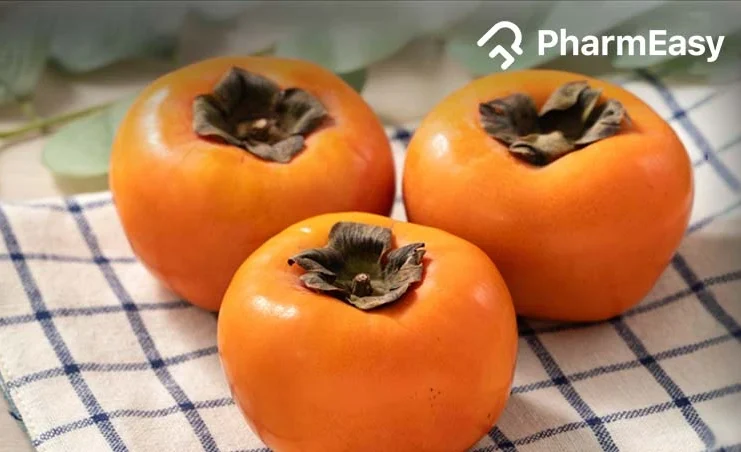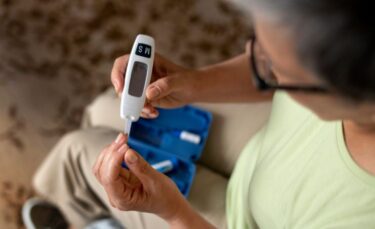Persimmon (Amlok) Fruit: Uses, Benefits, Side Effects By Dr. Rajeev Singh
By Dr Rajeev Singh +2 more

Get,

to manage your symptom
Get your,


4 Cr+ families
benefitted

OTP sent to 9988776655



You’ve successfully subscribed to receive
doctor-approved tips on
Whatsapp

Get ready to feel your best.

Hi There,
Download the PharmEasy App now!!


Register to Avail the Offer
Send OTPBy continuing, you agree with our Privacy Policy and Terms and Conditions

Hi There,
Sign up on PharmEasy now!!
Trusted by 4 crore+ families

OTP sent to 9988776655



You have unlocked 25% off on medicines




Code: NU25
By Dr Rajeev Singh +2 more
Table of Contents
Have you ever wondered which fruit twins with oranges? It is persimmon! A fibrous, fleshy, deciduous and tropical fruit. The scientific name of persimmon is Diospyros kaki, and it belongs to the family Ebenaceae. Persimmons are commonly cultivated in countries like Japan, China, Korea, Brazil, Italy and Turkey. However, the maximum production of persimmon is from China. There are about 400 species of persimmon, did you know? It is the fifth fastest-developing fruit crop in the world! Persimmons have been gaining popularity due to their hidden health benefits1,2. Let us have a glance at some of them.

Persimmon fruits may contain several bioactive compounds like proanthocyanidins, catechins, triterpenoids, carotenoids, tocopherols, flavonoids, tannins, phenolic acids, polyphenols and many more. Additionally, persimmon fruit may contain the following nutrients:
Several studies have shown that persimmon fruit may have the following properties1:
Persimmon fruit is highly nutritious and packed with vitamins, polyphenols, and dietary fibre. Fermented versions of Persimmon fruit might be associated with helping in around 15% weight reduction and reduced liver and abdominal fat13.
Dr. Siddharth Gupta, B.A.M.S, M.D (Ayu)
Some of the potential uses of persimmon fruit are:

A study4 by Buelga et al. in 2000 showed that bioactive proanthocyanidins in persimmon fruit might help lower blood pressure. It may also reduce the risk of platelet aggregation and thereby reduce the occurrence of thrombosis. Thrombosis occurs when a blood clot blocks the arteries or veins. Persimmon can also enhance nitric oxide production in the body, which may further relax the blood vessels to improve blood flow. In these ways, persimmon may be beneficial in reducing the risk of heart diseases2,4. However, more studies on humans are yet to be done to check the effect of persimmon fruit for heart conditions. Therefore, you must consult your doctor if you have any symptoms of heart disease and not just rely on persimmons.

A study5 by Gorinstein et al. in 2000 on rats suggested that persimmon fruit may reduce bad cholesterol levels and triglycerides. This may be attributed to its antioxidants like lycopene and epigallocatechin-3-O-gallate (EGCG)2,5. However, these are data from animal studies, and further studies on humans are yet to be done. Therefore, you must consult your doctor for abnormal cholesterol levels instead of self-medicating.

There are possible persimmon fruit benefits for the management of diabetes. A study6 by Lee et al. In 2007 showed that proanthocyanidins in persimmon might inhibit the enzymes α-amylase and α-glucosidase. These enzymes may metabolize carbohydrates into glucose which enters the bloodstream. This may delay glucose uptake in the blood, thereby reducing blood glucose levels. Additionally, persimmon fruit may inhibit the rapid absorption of glucose after eating carbohydrate-rich meals, which may inhibit the spike of blood sugar levels2,6,7. However, more studies are required to check if persimmon fruit may be beneficial for the management of diabetes. Therefore, you must check your blood glucose level regularly and consult your doctor in case of a high blood glucose level.

A study8 by Jo et al. in 2011 showed that persimmon fruit might inhibit cancer cell growth. Bioactive compounds like carotenoids and catechins in persimmon fruit may be beneficial for breast, prostate, oral and blood cancer2,8. However, more studies are required to confirm if persimmon fruit can help in cancer. Cancer is a dangerous disease; therefore, you must get proper treatment instead of self-medicating.

A study9 by Jeun An et al. in 2005 showed that persimmon leaf extract might be beneficial for various skin problems like skin eruptions, eczema (inflammation of the skin) and acne. This use may be due to bioactive compounds like flavonoids, catechins, β-carotenes, tannins, organic acids and vitamins B1, B2, C, and K9. However, more studies are required to assess persimmon fruit benefits for skin.

A study10 by Matsumura et al. in 2017 showed that tannins present in persimmon might act against bacteria like those of the Mycobacterium species, which may cause lung infections. Additionally, it may reduce inflammation caused due to bacterial infections10. However, further studies are required to check if persimmon fruit may be used in case of bacterial infections. Therefore, you must consult your doctor if you suspect a bacterial infection.

A study15 by Seddon et al. in 1994 showed that lutein, a bioactive compound in persimmon, may protect the macula part of the eye from damage. The macula is a yellow spot at the back of the retina in the eyes, which is responsible for the central vision. Lutein (a carotenoid) present in persimmon fruit is also found in the macula of the eye2. However, further research is yet to be done to check if persimmon can be used to protect the macula from damage. Therefore, you must consult your doctor if your vision is hampered.
Though studies show the benefits of persimmon fruit in various conditions, these are insufficient, and there is a need for further studies to establish the true extent of the benefits of persimmon fruit on human health.
According to my observations, an increase in free radicals can lead to oxidative stress that results in cell damage. As Persimmon fruit is packed with bioactive compounds such as proanthocyanidins, tannins, carotenoids, etc., it can act as an antioxidant and might aid in coping with cell damage14.
Dr. Rajeev Singh, BAMS
Persimmons can be included in your diet in the following way:
You must consult a qualified doctor before taking persimmon fruit in large quantities or any herbal supplements. Do not discontinue or replace an ongoing treatment of modern medicine with an ayurvedic/herbal preparation without consulting a qualified doctor
A clinical trial has shown that persimmon fruit side effects may be as follows. However, additional large-scale studies are required to confirm the following side effects, as typically, this fruit is not known to produce any serious side effects:
You must consult your doctor if you experience any side effects after consuming persimmon fruit.
Also Read: Praval Pishti: Uses, Benefits and Side effects By Dr. Rajeev Singh
Adequate precautions should be taken before consuming persimmon fruit, like any other medicine. Pregnant women and lactating mothers should be extra cautious. Likewise, before giving persimmon fruit to the elderly or children, precautions should be taken. Therefore, it is suggested to consult a doctor before using persimmon fruit for these individuals in case of any medical conditions.
Also Read: Cantaloupe: Uses, Benefits & Side Effects
There are not enough studies on the interaction of persimmon with other drugs. Further studies on the interaction of persimmon fruit are yet to be done. Therefore, you must consult your doctor if you are on any other medication before consuming persimmon fruits.
Also Read: Elephant Yam (Suran): Uses, Benefits, Side Effects and More!
There are several persimmon health benefits. It may protect the macula, improve heart health and lower cholesterol levels. It may also be used against bacterial infections and diseases like diabetes. In addition, persimmon fruit may benefit the skin. However, you must consult your doctor if you have any diseases instead of self-medicating1,2,4,10.
Persimmon may cause pruritis (itchy skin), urticaria (swelling, redness and itching on the skin), oedema (swelling due to excess fluid trapped), trigger asthma, rhinorrhea, stomach and many more. It may cause nausea and make you feel dizzy11.
You must consult your doctor if you experience any side effects after consuming persimmon fruit.
Persimmon fruits may contain several bioactive compounds like proanthocyanidins, catechins, carotenoids, tocopherols, flavonoids, tannins and many more. Additionally, persimmon fruit may contain water, energy, carbohydrates, fats and proteins. It may contain minerals like phosphorous, sodium, calcium, iron, potassium and many more. It may contain vitamin C and many amino acids1,3.
Oligomers and polymers present in bioactive compound proanthocyanidins in persimmon fruit might inhibit the activity of enzymes α-amylase and α-glucosidase which may delay glucose uptake and reduce blood sugar levels. Additionally, persimmon fruit may inhibit the rapid absorption of glucose in the body after eating carbohydrate-rich meals2,6,7. However, you must check your blood glucose level regularly and consult your doctor in case of a high blood glucose level.
Bioactive proanthocyanidins in persimmon fruit might help to lower blood pressure and reduce the risk of platelet aggregation and thereby, reduce the occurrence of thrombosis (blood clot formation). Persimmon can also relax the blood vessels to improve blood flow by enhancing nitric oxide production2,4. However, you must consult your doctor if you have any symptoms of heart disease.
Disclaimer: The information provided here is for educational/awareness purposes only and is not intended to be a substitute for medical treatment by a healthcare professional and should not be relied upon to diagnose or treat any medical condition. The reader should consult a registered medical practitioner to determine the appropriateness of the information and before consuming any medication. PharmEasy does not provide any guarantee or warranty (express or implied) regarding the accuracy, adequacy, completeness, legality, reliability or usefulness of the information; and disclaims any liability arising thereof.
Links and product recommendations in the information provided here are advertisements of third-party products available on the website. PharmEasy does not make any representation on the accuracy or suitability of such products/services. Advertisements do not influence the editorial decisions or content. The information in this blog is subject to change without notice. The authors and administrators reserve the right to modify, add, or remove content without notification. It is your responsibility to review this disclaimer regularly for any changes.
Comments

Leave your comment...
You may also like
Comments